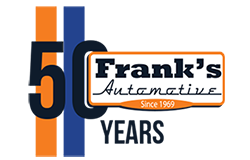-
Signs of a Transmission Problem
When you drive a luxurious German vehicle, you will feel great knowing that your car’s transmission has been crafted from top quality components. Even the best transmissions, however, will eventually require transmission repair after many miles of driving. When you start to see the signs of transmission problems in your German car, you should be sure to call your transmission shop serving Sacramento. Using the latest transmission service equipment, your technicians can return your transmission to safe driving condition. If you are wondering whether it is time to schedule repairs, here is a look at the top 3 signs that your car has a transmission problem.
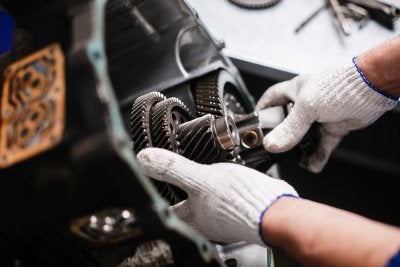
Slipping Gears
A transmission that is experiencing mechanical problems may begin to gradually slip in and out of gear. Typically, a slipping transmission feels as though it is lacking power or struggling to remain in the proper gear. When your car starts to lose its smooth shifting performance and overall transmission power, you will need to schedule immediate transmission repair services.
Failure to Move Forward
When your transmission is functioning properly, it will engage as soon as you shift your car from park into drive. If you have started to feel as though your car fails to move forward right away after you move the stick shift, you may be suffering from transmission problems. By adjusting the gear ratio of your transmission, your mechanic will be able to make sure that your car is fully responsive to your shifts.
Leaking Fluid
Leaking transmission fluid is a sign of a very severe transmission problem. When your transmission fluid leaks, the gears inside of your car may begin to grind or overheat. In order to identify a transmission fluid leak in your vehicle, you can look for a bright red puddle that forms underneath where your car is parked. You can also check to see if your transmission fluid is low by examining the dipstick in your car’s engine.
-
Reasons to Get a Pre-Purchase Inspection
Purchasing a used car is a savvy investment for any driver. Before you place a down payment on a used German auto, however, you may want to bring the vehicle to an auto mechanic in Sacramento for a pre-purchase inspection. During the pre-purchase inspection, your car repair professional will carefully evaluate the performance, safety, and efficiency of all of the vehicle’s vital systems. To emphasize the benefits of having your used car inspected before you buy, here is a brief overview of 3 reasons to schedule a pre-purchase inspection.
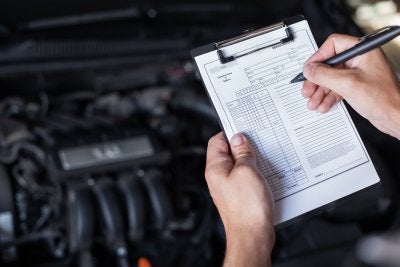
Identify Potential Problems
One of the top reasons to schedule a pre-purchase inspection at Frank’s Automotive for your used vehicle is that the inspection process will allow you to identify any potential problems that may be going wrong underneath the hood. Your mechanic will be able to tell you whether the brakes, coolant lines, or other major systems are going to require major repairs at any time in the near future. If the inspection does not reveal major mechanical problems, you can make your purchase with confidence.
Avoid Buying a Lemon
After you purchase a used car, you will not want to find out about major mechanical issues that were not revealed to you prior to the sale. With a pre-purchase inspection, you can ensure that you are not buying a car that is destined to break down. A qualified mechanic will be familiar with your make and model of car, so he will be able to warn you of any mechanical problems that are common with that type of vehicle.
Receive a Better Price
If the pre-purchase inspection reveals the need for certain mechanical repairs, you may be able to use this information to negotiate a better price for your vehicle. Your mechanic can provide you with an estimate for the cost of repairing the car, and you can relay this information to the seller. Ultimately, your pre-purchase inspection will allow you to get a fair price on a car that is in good mechanical condition.
-
What to Know About Your Car’s Electrical System
Your car is more than a thousand pounds of metal on wheels; it also involves complex automotive electronics in Sacramento to make itself as safe, effective, and convenient as possible. It’s a good idea to familiarize yourself with some of the automotive electrical components that are included in your car; this will also help you identify problems early on. Be sure to talk to your alternator repair specialist for tips on solving electrical problems, and take a look ahead for more on what you should know about your car’s electrical system.
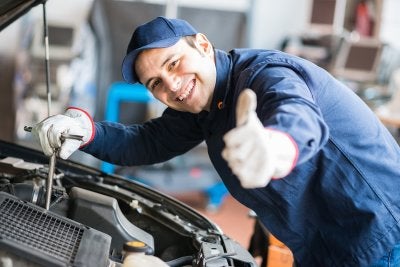
Electrical Components
A vehicle’s electrical system is made up of several components, all of which serve specific purposes and contribute to the overall functioning of your car. In addition to your radio, dashboard camera, and built-in television screens, your automotive electronics consist of systems like the battery, the computer, and the alternator. These components are important when it comes to basic functioning of your car—even getting it started. Your electrical system keeps you and others safe by powering your headlights and your turning signals, while your alternator allows your vehicle to keep moving. Knowing about your automotive electronics and what they do can make you better prepared to notice problems with your electrical system. An important fact about most modern cars, all components from light management to stereo to engine management communicate with each other. With electrical issues, you want to start with the basics.
Common Problems
If you get into your car on a hot day and try to roll your windows down to no avail, there might be a problem with your electronic system. Similarly, having trouble starting your car or issues with your seats and automatic locks can point to automotive electrical problems. You might even notice your headlights dimming or shutting off completely, which can compromise your safety on the road. How you handle these issues can impact the working life of your vehicle and your own wellbeing.
How to Solve Them
It’s always a good idea to talk to a professional when working on your automotive electrical system. You want to make sure your battery and charging systems are in proper functioning order. So it is important to check all systems when looking for electrical gremlins. You might end up doing more harm than good if you try to deal with the problem on your own, so play it safe and see your specialist for professional help.
-
Improving Your Car’s Mileage
Improved fuel economy is a top concern for many drivers. When you watch this video from Mobil 1, you will learn some tips and tricks for improving the gas mileage of your vehicle. In order to improve the MPGs of your vehicle, you will want to drive at a consistent and steady speed at all times. Additionally, you can boost fuel efficiency by reducing excess weight from your vehicle. An auto mechanic in Sacramento can provide you with additional information about boosting your car’s fuel economy.
When you visit the auto shop , be sure to ask your auto technician about any tips or tricks that you can use to improve the fuel economy of your car. From performance enhancements to basic automotive maintenance procedures, there are several steps that you can take to achieve the best efficiency out of every drive.
-
Checking Your Fuel Pressure
In order for your vehicle to continue to run safely and efficiently, it’s essential that the fuel that flows into the engine is properly pressurized. If your fuel pressure is lower than it should be, this will likely result in substandard performance. If you don’t have the pressure adjusted, it can even lead to damage to your engine. In order to avoid the need for engine repair at a Sacramento auto shop, it’s smart for every car owner to take the time to learn how to check fuel pressure—and when to do it.
What causes low fuel pressure? Low fuel pressure in your vehicle can be due to a number of causes. If you have a clogged filter, a defective or damaged fuel pump, or a malfunctioning regulator, it can result in inadequate fuel pressure. Whatever the cause is, however, it’s essential that you find out about your low fuel pressure right away.
When should fuel pressure be checked? As a rule, your fuel pressure should be checked every time you have a professional inspection. You should also check your fuel pressure any time that you observe any of the symptoms of a potential problem. Some common warning signs of a fuel pressure issue include unusually high fuel pressure, backfiring, and difficulty driving uphill. If you’re getting poor mileage, that may also be a sign that you have a fuel pressure issue.
How do you check your fuel pressure? Checking your fuel pressure is a quick and simple task. First, you’ll need to purchase a fuel pressure gauge. Be sure to have your vehicle owner’s manual on hand. Then, find the fuel pump test point on your vehicle and attach the gauge. Then, ask somebody else to start the engine while you look at the gauge. The gauge should come up to the appropriate reading for your vehicle, which you can find in your owner’s manual. If it doesn’t, then your fuel pressure isn’t at the right level.
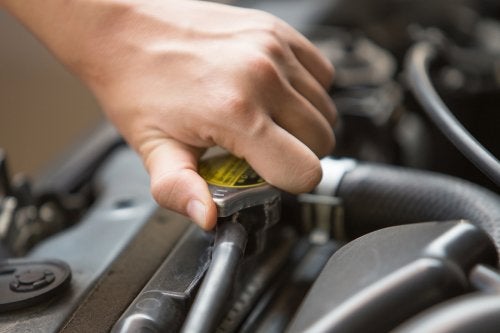
-
Why Is Your Check Engine Light On?
Check engine light on? This is one of the biggest automotive headaches drivers deal with, not necessarily because a check engine light means anything serious but because of the number of different possibilities that could be causing the light to come on. That’s why your best bet is to visit an auto repair shop in Sacramento that specializes in check engine light diagnostics . A mechanic will use advanced diagnostic equipment to pinpoint exactly what’s causing your check engine light to come so you can get back on the road as quickly as possible. In the meantime, here’s a look at some possible causes of a check engine light.
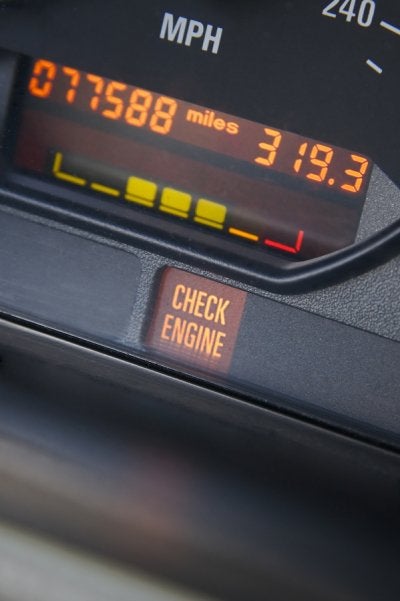
Faulty Oxygen Sensor
The oxygen sensor measures the amount of unburned oxygen in the vehicle’s exhaust system. A faulty oxygen sensor can cause the engine to burn more fuel than needed, resulting in up to 40% lower fuel economy. Failure to replace a faulty oxygen sensor over time can also cause damage to the catalytic converter.
Damaged Catalytic Converter
The catalytic converter converts carbon monoxide into carbon dioxide. Typically, the catalytic converter will become damaged due to neglected maintenance or a problem with one of the sensors (mass airflow sensor, oxygen sensor, etc.). Your vehicle will not pass emissions testing with a faulty catalytic converter, and you can experience reduced performance in addition to poor fuel economy.
Loose or Missing Gas Cap
That’s right, one of the most common causes of the check engine light is simply a loose or missing gas cap. If the check engine light is on, make sure the gas cap is securely fastened and doesn’t appear to be cracked, chipped, or visible damaged in any way. If the gas cap looks good, bring your vehicle to an auto repair shop in Sacramento and let a mechanic perform a check engine light diagnostic to figure out exactly what’s going on with your car.
RECENT POSTS
categories
- Uncategorized
- Automotive
- automotive diagnostics services
- Frank’s Automotive
- auto shop
- oil change
- Auto mechanic
- Maintenance
- maintenance schedule
- Catalytic Converter
- Engine Light
- oxygen sensor
- Transmission Problems
- BMW
- Pre-Purchase
- Brakes
- Anti-Lock Brakes
- Auto Diagnostics
- Alternator Repair
- Slipping Transmission
- Engine Trouble
- Brake Sounds
- Frank’s Automotive
- Frank Lettini
Archives
2022
2020
2019
2017
2016
- December (4)
- November (5)
- October (4)
- September (4)
- August (4)
- July (4)
- June (4)
- May (4)
- April (4)
- March (4)
- February (4)
